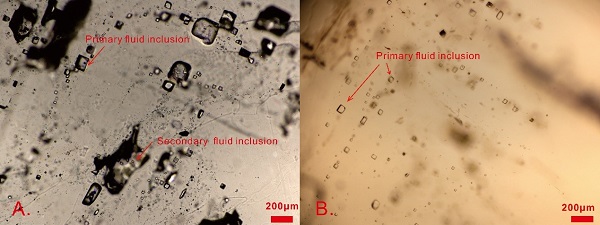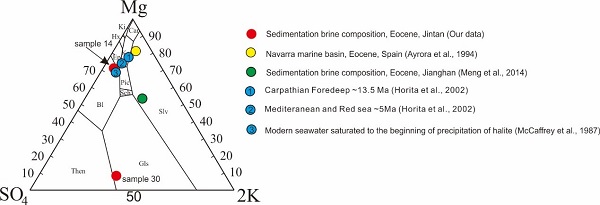From Late Cretaceous to early Tertiary in eastern China, a large number of inland saline oil and gas basins developed, such as Shengli Oilfield, Zhongyuan Oilfield, Jiangsu Oilfield and Jianghan Oilfield. Since the discovery of marine calcium algae and ostracod fossils in Shengli Oilfield in 1979, whether marine transgression has occurred in eastern China has become the focus of petroleum academic debate. The horizon where transgression occurs often enriches evaporite and main source rock. Therefore, this problem has caused academic debate for more than 40 years.
Among them, Professor HE Chengquan from Nanjing Institute of Geology and paleontology, Chinese Academy of Sciences (NIGPAS), thinks that some dinoflagellate fossils from Shengli oil field in Bohai Bay Basin are marine origin, and they appear in the transgressive sediments in western Xinjiang at the same time. While according to the geochemical analysis of marine geologists from TongJi University, the strontium isotopic compositions of calcareous nannofossil shells are obviously higher than that of the same period of seawater, indicating that these organisms lived in inland salt lake environment which is obviously different from that of seawater.
Seawater intrusion can occur in a short period of time, which is difficult to preserve in geological records. Salt deposits can record very short-term geological events in geological history. In order to solve this puzzle, Associate Professor MENG Fanwei, of Nanjing Institute of Geology and paleontology, Chinese Academy of Sciences (NIGPAS), cooperated with Professor NI Pei of Nanjing University and Dr. Galamay of Ukrainian Academy of Sciences to conduct a preliminary study on the drilling of Jintan Salt Mine in Jiangsu Province, China. In the lower part of salt deposit in the Jintan basin, the brine composition in the fluid inclusion is similar to the seawater in the same period, while the brine component in the upper part of the salt deposit is gradually transformed into the inland salt lake component. The research results have been published in Marine and Petroleum Geology online, a well-known international academic journal in the field of petroleum geology.
This discovery strongly supports the view that transgression exists in eastern China. However, due to the influence of inland environment after seawater intrusion, the sedimentary environment of "marine source continental facies" has been formed, and the composition of brine has changed greatly.
This discovery not only solves the long-standing controversy in the petroleum field of China, but also provides a theoretical basis for the correct evaluation of source rocks from Late Cretaceous to early Tertiary in oil and gas fields in eastern China.
The research was supported by the China Israel cooperation project of NSFC and the original innovation project "from 0 to 1".
Reference: Fan-wei Meng, Anatoliy R. Galamay, Pei Ni, Naveed Ahsan, Saif Ur Rehman, Composition of middle-late Eocene salt lakes in the Jintan Basin of eastern China: Evidence of marine transgressions, Marine and Petroleum Geology, Volume 122, 2020, 104644, https://www.sciencedirect.com/science/article/pii/S026481722030427X

Photomicrographs showing primary fluid inclusion banding in hopper halite from the Jintan Basin

Results and comparative analysis of fluid inclusions in the Eocene non-marine halite (our data) with modern seawater (McCaffrey et al., 1987), marine Eocene halite (after Ayora et al., 1994) on a Janecke diagram (after Valyashko, 1962)
